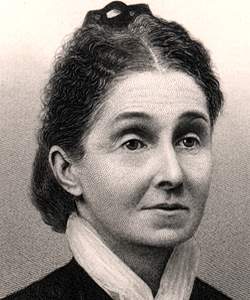Virginia Minor (American National Biography)
Scholarship
In 1867 she circulated a petition to the state legislature asking that a constitutional amendment that was under consideration for black male suffrage be expanded to include women. Although she obtained several hundred signatures, her request was soundly defeated. A few months later she helped organize the Woman Suffrage Association of Missouri--the first organization in the world dedicated solely to that aim. Minor served as the association's president for the next five years.
In 1869 the Missouri association organized a national suffrage convention in St. Louis. [Virginia] Minor electrified the participants with a speech asserting that women already had the right to vote since the Fourteenth Amendment (ratified the year before) had guaranteed "equal protection of the laws" to all American citizens. Suffrage, she maintained, was a privilege of citizenship. Striking a note that sometimes characterized suffragism during these years, Minor deplored the fact that a "free, moral intelligent woman, highly cultivated," who paid taxes just as a man did, should be placed below black males and naturalized foreigners and reduced to "a level with the savage"--American Indians, who also could not vote. She called on women to demand their rights in state legislatures, and if they were rejected to take their case to the Supreme Court. Her position was outlined in a set of resolutions written by her husband, which was adopted by the convention.
In 1869 the Missouri association organized a national suffrage convention in St. Louis. [Virginia] Minor electrified the participants with a speech asserting that women already had the right to vote since the Fourteenth Amendment (ratified the year before) had guaranteed "equal protection of the laws" to all American citizens. Suffrage, she maintained, was a privilege of citizenship. Striking a note that sometimes characterized suffragism during these years, Minor deplored the fact that a "free, moral intelligent woman, highly cultivated," who paid taxes just as a man did, should be placed below black males and naturalized foreigners and reduced to "a level with the savage"--American Indians, who also could not vote. She called on women to demand their rights in state legislatures, and if they were rejected to take their case to the Supreme Court. Her position was outlined in a set of resolutions written by her husband, which was adopted by the convention.
Sandra Opdycke, "Minor, Virginia Louise," American National Biography Online, February 2000, http://www.anb.org/articles/15/15-00482.html.





